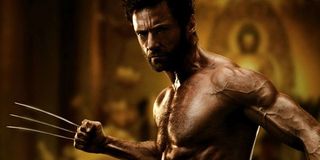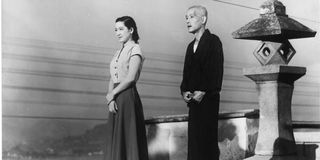How The Wolverine Is A Western Set In Japan, Inspired By Clint Eastwood

We’ve said it before, but it bears repeating: the Western and the Samurai movie are two sides of the same coin. No one is having to say this more right now than The Wolverine director James Mangold, who admits readily that his latest Logan tale borrows heavily from influences from East and West. Set in modern-day Japan, The Wolverine stars Hugh Jackman as the titular outsider who is a modern cowboy or ronin—depending on your point of view—as he battles against a mysterious foe to do right by an old friend’s last wish.
Over the course of a press conference for The Wolverine, Mangold and Jackman, the film’s star and producer, spoke at length about the film’s inspirations. Of course, there was the source material of Wolverine comics by Chris Claremont and Frank Miller. But then there were the more intriguing blend of Western and Samurai movies. For Mangold the idea of an outside, a lone man, was key to building on Wolverine’s pre-existing story:
“Obviously, there's been a huge amount of dialogue between those two (genres) over the years. But that was something we really focused on. For me…trying to get inside of all the characters in this movie—means you need space. You need space from other mutants. You can't get inside characters when you have a movie that has 12 mutants in two hours; then each character has eight minutes if that. So you need a story that has openings for people to expose what's inside them, or the pressure. And the Western is a beautiful example of something that is a format of both action and character; and always has been. I mean, it's not really about horses and guns its really about the kind of dark texture underneath."
Mangold knew early on which Western in particular he wanted to emulate, Jackman remembers:
“Jim said to me in the very first conversation we had when I rang him about it and he'd read the script, 'Tonally I'm thinking The Outlaw Josey Wales’…that was the tone, and immediately I knew we were going to create something different. And setting it in Japan obviously makes it different. We wanted to make it a stand-alone. We didn’t want it to feel like any other Wolverine movies or any other comic book movies. We wanted this to be in service to the character.”

Also important to its filmmakers was getting the depiction of Japan right. Mangold counts himself as a huge fan of Japanese movies, and wanted to fold elements of samurai movies, Yakuzi crime dramas, fantasy films, historical drama and Westerns in together. But how to do all that and make Japan seem a grounded setting--especially as a foreigner who admittedly didn’t know Japan personally? Mangold turned to one of his idols:
“As I was developing the script (a major influence was) one of the most Japanese directors, one of the directors who allows you into Japanese culture the most but is least appreciated in the west is Ozu…He had a huge period of making movies about Japanese life and domestic life, city and country, particularly kind of flourishing post-war. Beautiful films that had a big effect--however strange it seems--on this movie and the look of it.”
He went on to explain he used Yasujirô Ozu’s movies to guide him in his location scouting, and hopes fans will notice the particular influence of Tokyo Story on Wolverine’s journey in the film. But also key to The Wolverine’s distinct portrait of Japan was its Japanese cast that included Hiroyuki Sanada, Rila Fukushima and Tao Okamoto. Mangold explains why their input proved priceless:
“"I think that to the degree we are successively not existing only in clichés of Japanese life, I think that is a credit honestly to the cast, who were very vigilant, and kind to me, and gentle in explaining when I was doing something idiotic. But also we're watching out for language, and custom, and helping me with blocking. And even on days they weren't working in character, they were coming by set.”
Sanada, who is a major star in Japan with more than 60 films to his credit, says the respect and admiration was mutual, offering:
“As a Japanese actor, I would like to say thank you to Jim and Hugh and every crew and cast member because a lot of movies located in Japan sometimes (show) a lot of misunderstandings of our culture. But they respected our culture and researched a lot. So when I saw the movie I was so happy because this movie had great balance, a nice mixture of East and West, and tradition and modern. I believe Japanese audiences will be happy if they are watching. Something very super modern Japan with nostalgia with a taste of old classic Japanese movies… I think it's a great mixture. So I am very happy to be a part of this movie."
As sometimes happens, the press conference was a love fest with compliments being shared back and forth. But Jackman made it a point to give the press an insight into just how generous Sanada really was with his time:
CINEMABLEND NEWSLETTER
Your Daily Blend of Entertainment News
"I'm just going to tell a story about Hiro…it was beautiful what you said and its indicative of who you are. I have to tell one story. We were in Sydney, shooting in what is actually the Chinese Gardens we turned into a sort of a funeral site. And as we were finishing the set one day, I saw the lineup of all the extras, and they were lining up. And I thought normally extras just bolt, you know leave. Maybe they're collecting mobile phones, maybe they are handing over some prop…When I crane my head around the side (to see what they were lining up for there) was Hiro…he's an icon there. He stood on the side and shook their hands and bowed and thanked every extra on the film. So, when people say to me, 'You're known as a nice guy in Hollywood,' I go, 'I ain't nothing.' The humility, the respect and the generosity was there with Hiro, was there with the girls (Fukushima and Okamoto), and it made a huge difference."
The Wolverine opens Friday.
Staff writer at CinemaBlend.
Most Popular





